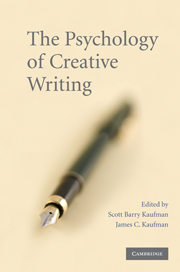Book contents
- Frontmatter
- Contents
- Contributors
- Foreword
- Preface
- Acknowledgments
- PART I THE WRITER
- PART II THE TEXT
- PART III THE PROCESS
- PART IV THE DEVELOPMENT
- PART V THE EDUCATION
- 17 How Rewards and Evaluations Can Undermine Creativity (and How to Prevent This)
- 18 Teaching Writing by Demythologizing Creativity
- 19 Creation and Response: Wellspring to Evaluation
- 20 Fostering Creative Writing: Challenges Faced by Chinese Learners
- 21 Putting the Parts Together: An Integrative Look at the Psychology of Creative Writing
- Index
- References
17 - How Rewards and Evaluations Can Undermine Creativity (and How to Prevent This)
Published online by Cambridge University Press: 25 January 2010
- Frontmatter
- Contents
- Contributors
- Foreword
- Preface
- Acknowledgments
- PART I THE WRITER
- PART II THE TEXT
- PART III THE PROCESS
- PART IV THE DEVELOPMENT
- PART V THE EDUCATION
- 17 How Rewards and Evaluations Can Undermine Creativity (and How to Prevent This)
- 18 Teaching Writing by Demythologizing Creativity
- 19 Creation and Response: Wellspring to Evaluation
- 20 Fostering Creative Writing: Challenges Faced by Chinese Learners
- 21 Putting the Parts Together: An Integrative Look at the Psychology of Creative Writing
- Index
- References
Summary
Since the seminal publication of Amabile's (1983) Social Psychology of Creativity, creativity researchers have been aware of the negative impact that rewards and evaluations can have on creative performance. Her work, in turn, was rooted in well-established findings on the effects of extrinsic motivation on intrinsic motivation, as described in The Hidden Cost of Rewards (Lepper & Greene, 1978). Although Amabile's basic idea has been refined and qualified to some extent (see, e.g., Amabile, 1996; Baer, 1997b, 1998b), the core insight remains: Extrinsic constraints, such as rewards and evaluations, tend to drive out intrinsic motivation.
This often puts composition teachers in a difficult position, because (a) the development of writing skills often requires feedback on performance (i.e., students' work must be evaluated) and (b) students sometimes need to be bribed to do things they do not wish to do (i.e., students may sometimes need to be offered rewards to get them to write). This tension is part of a larger conflict between enhancing creativity more generally and helping students acquire skills and content knowledge (Amabile, 1983, 1996; Baer, 1997a, 2002, 2003; Kaufman & Baer, 2002, 2005, 2006); that conflict, in turn, is part of the larger question of the relationship between learning content and learning to think more effectively (see, e.g., Chi, Glaser, & Farr, 1988; Glass & Holyoak, 1986; Hirsch, 1996; Johnson-Laird, 1983; Karmiloff-Smith, 1992; Paul, 1990; Simon & Chase, 1973; Woolfolk, 2006).
Information
- Type
- Chapter
- Information
- The Psychology of Creative Writing , pp. 277 - 286Publisher: Cambridge University PressPrint publication year: 2009
References
Accessibility standard: Unknown
Why this information is here
This section outlines the accessibility features of this content - including support for screen readers, full keyboard navigation and high-contrast display options. This may not be relevant for you.Accessibility Information
- 2
- Cited by
